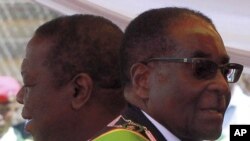Zimbabwe’s public servants received at least a $100 monthly pay raise this week but many are not sure whether this was a one time pay boost or whether it will continue. Movement for Democratic Change (MDC) finance minister Tendai Biti has said repeatedly that Zimbabwe’s tax revenue has been insufficient to increase public workers’ wages.
The Zanu PF controlled state company, the Zimbabwe Mining and Development Corporation made $40 million available for the public service wage increase.
According to Finance Minister Tendai Biti, the increase was funded by sales of rough stones from controversial alluvial diamond mines in eastern Zimbabwe in which the government is a 50 per cent shareholder.
Biti has also repeatedly said the government treasury received no money from the diamond mines this year.
As civil service workers threatened strikes for better wages Biti told the unions he did not have sufficient tax revenue in the treasury to sustain wage increases.
According to Zimbabwe’s privately-owned daily newspaper, Newsday, Thursday, Biti says that the wage increase this month will have to be funded by diamond revenue as tax revenues are insufficient.
Newsday reported that the $40 million diamond money was not deposited into the treasury which Biti controls, but was paid into the public service salary department which automatically deposits public servants' wages into bank accounts.
Most civil servants have earned $200 per month since Zimbabwe abandoned its worthless local currency after years of hyper-inflation and adopted the U.S. dollar when the inclusive government came to power in February, 2009.
Zimbabwe President Robert Mugabe stepped into the wage controversey last month and guaranteed that public workers would get increases from sales of the diamonds.
Many civil servants on the streets say they are aware their $100 a month increase may only be temporary.
Kundai Sibanda started working two years ago in the Zimbabwe Information Ministry and he says he is concerned his pay increase will not be sustained.
"The increment that the government awarded the entire civil service is welcome although it is not enough," said Kundai. "Most of us have received $100 as an increment per month. We are worried this money might not be able to be coming next month.”
He says public sector wages have become a political battlefield between the two main parties in the inclusive government, Zanu PF and the MDC.
“So of course this issue is being taken politically that Mugabe has won by giving an increment that he promised, but definitely this is not what we wanted, this is just a smokescreen," he said.
Chisomo Dlela who is married with three children at school works at the head office of the health ministry. He says he too is worried the increase may be a one time thing.
“There is nothing we can do when it comes to the fact that they actually tell us that there is no money when you actually budgeted a certain salary to feed your own family or to do certain things," he said. "So that is where we face the problem.”
Finance Minister Tendai Biti has been heavily criticized by Zanu PF members of the legislature for not paying increases to public servants.
Zimbabwe cannot raise foreign loans and Biti runs a cash economy and says he only raised the budgeted goal of $230 million a month from tax revenues twice this year.
For five months of 2011 he said taxes brought in $100 million less per month than he had budgeted for. The government wage bill consumes $120 million a month, Biti said he regretted he could not find the money to pay increases.
While Zimbabwe expects growth of about seven percent this year economists say this is from a very low base as the economy was wrecked by hyper-inflation during the previous Zanu PF government.
Zimbabwe's alluvial diamond mines, which provided the funds for the pay increases, are controlled by supporters of Mr. Mugabe's Zanu PF party.
Zimbabwe Public Servants Worried About Pay Raise




